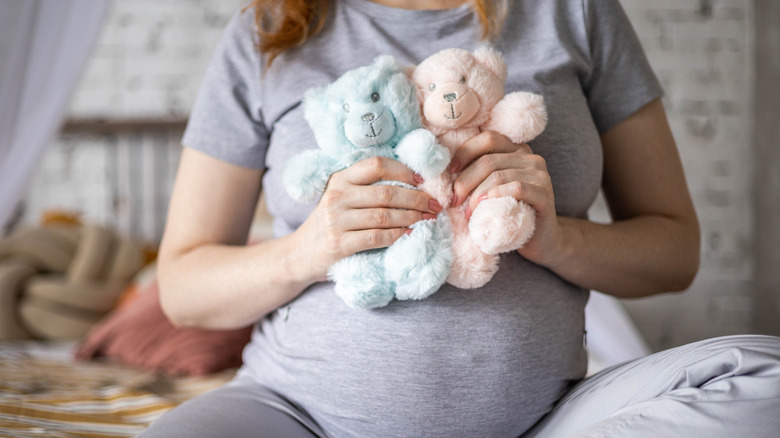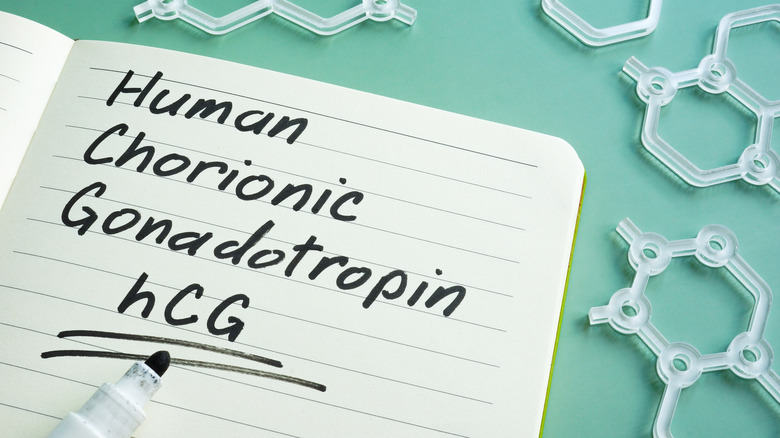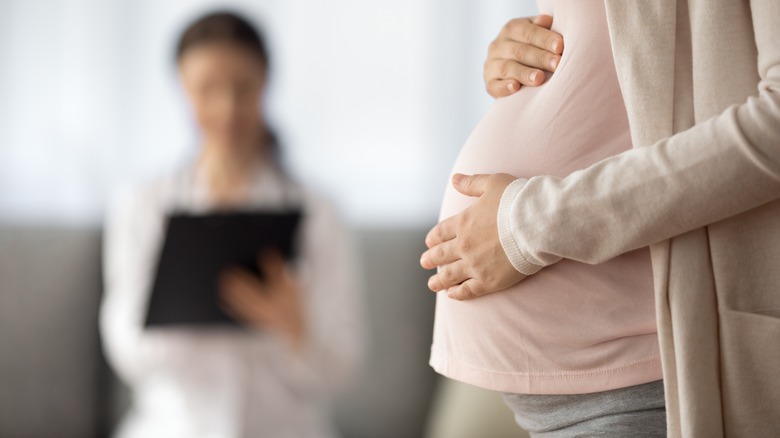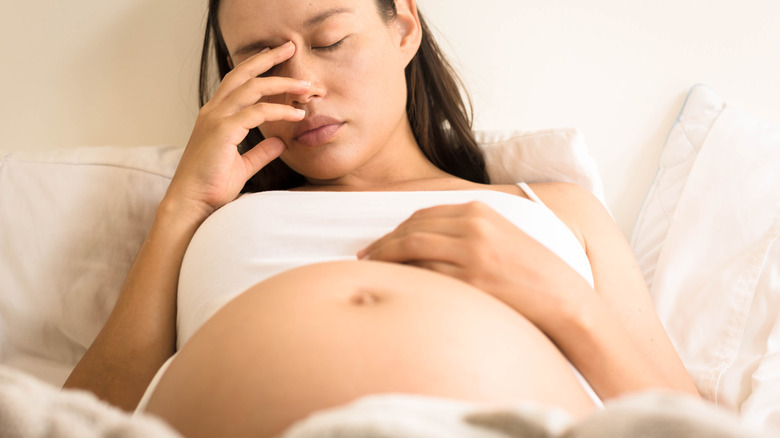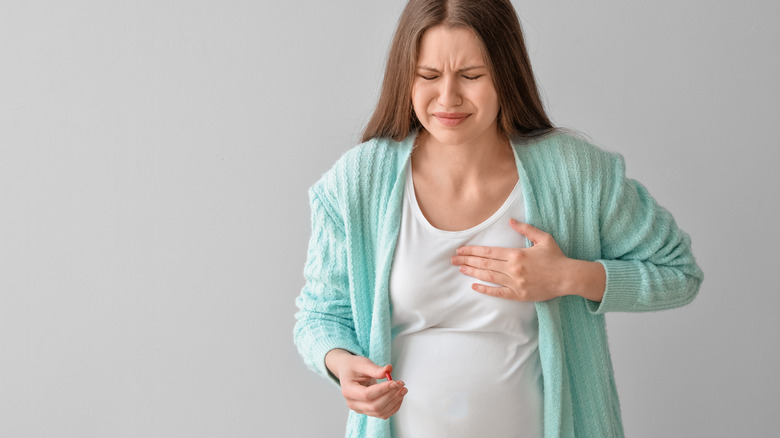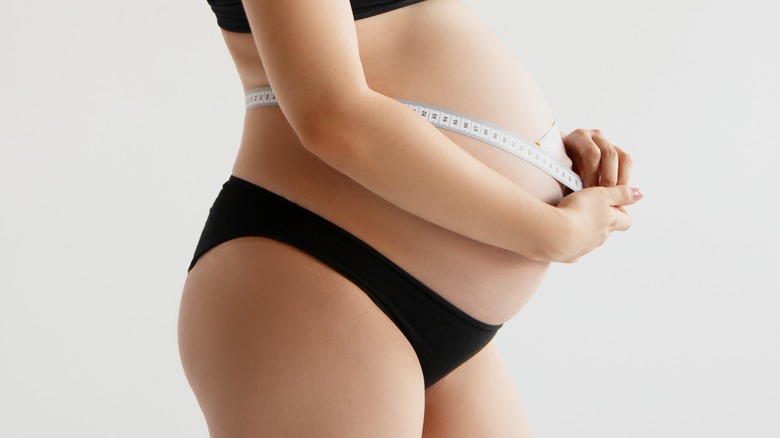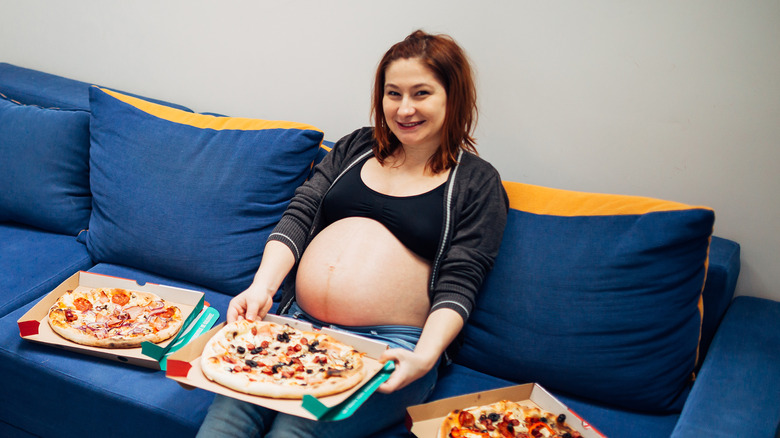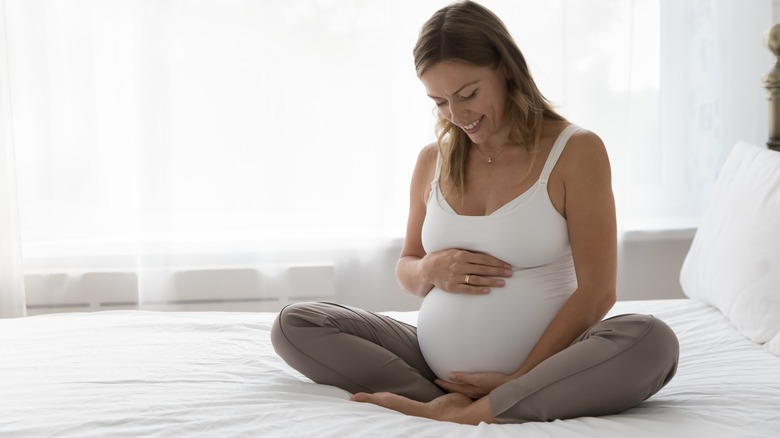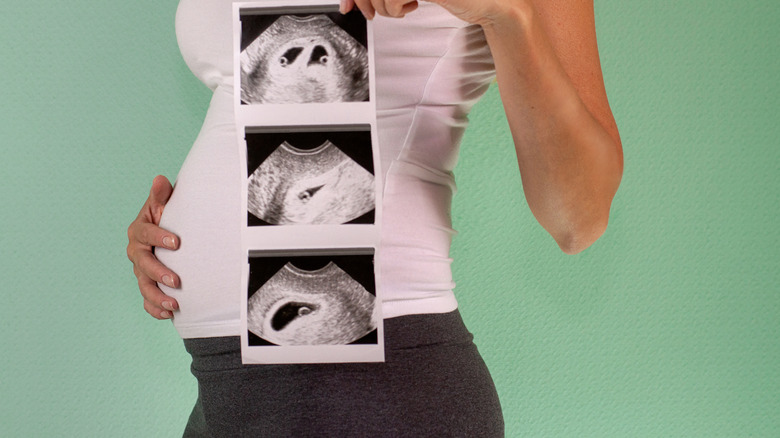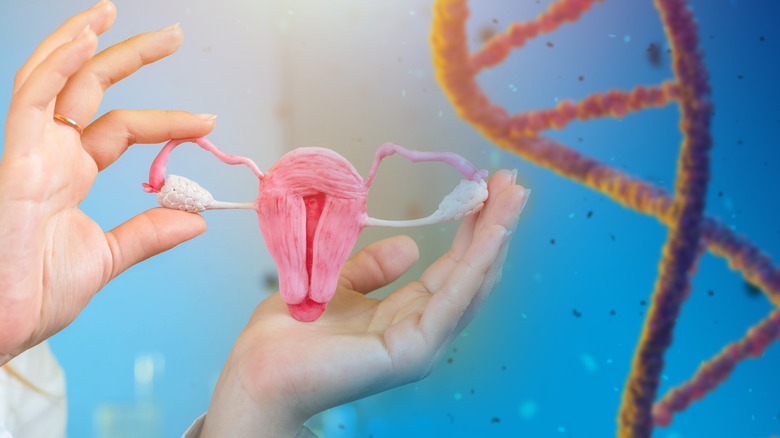Early Signs You Could Be Pregnant With Twins
Becoming pregnant with twins is a double blessing for many couples. You may anticipate the joy of raising two children who inevitably share every milestone, have the closest of sibling bonds, and will never lack a playmate (via Baby Centre). But being pregnant with two can come as a surprise. And it does come with some challenges and risks (via Johns Hopkins Medicine). Premature births (before 37 weeks) occur in 60% of twin pregnancies. This often comes with low birth weights and as a result, some time in the NICU (neonatal intensive care unit). There is also risk for anemia, high blood pressure, and miscarriage. And, there is a phenomenon known as twin-vanishing syndrome, in which there is more than one fetus at the beginning of the pregnancy, but one miscarries (or vanishes) within the first trimester. That said, early and consistent prenatal care can increase the chances for a safe and healthy twin pregnancy (via WebMD).
While it's impossible to be certain you're pregnant with twins until your first trimester ultrasound (via What to Expect), there may be some early signs you could be pregnant with twins (via BabyCenter).
Elevated hCG levels
Human chorionic gonadotropin (hCG) is a hormone produced in the placenta to support a growing embryo (via Cleveland Clinic). It can be detected in both urine and blood 10 to 11 days post conception and reaches its peak level toward the end of the first trimester. If your levels are detectable, two pink lines will appear on your home pregnancy test. Once a pregnancy has been confirmed, your doctor may order a blood test to further analyze your hCG levels and determine the status of your pregnancy and fetal development.
A study published in the Journal of Perinatal Medicine shows that women who are pregnant with twins have higher hCG levels than women who are expecting just one baby (via Doulas of Orange County). However, because hCG values are variable depending on the person and the pregnancy, a high hCG a not a definitive sign you will be having twins. Ultimately, only an ultrasound can visibly determine if you are having a multiple pregnancy — be it twins, triplets, or more (via Today's Parent).
High levels of alpha-fetoprotein
Alpha-fetoprotein (AFP) is what it sounds like — a fetal protein. It's made by a fetus's liver and yolk sac (via Medline Plus). Higher levels of alpha-fetoprotein have been associated with twin pregnancies. According to a 2016 study in Biomedical Reports, the levels of alpha-fetoprotein were twice as high in twin pregnancies as compared to singleton pregnancies during weeks 16 and 17.
All pregnant women should consider an AFP screening to detect any potential for abnormality in the pregnancy (via American Pregnancy Association). This test does not determine a diagnosis, but rather signifies if further testing is necessary. Abnormal AFP levels are associated with various conditions such as neural tube defects and Down syndrome, as well as twin pregnancies. That said, the most common reason for high levels may be an inaccurate dating of the pregnancy. This is because AFP levels heighten, plateau, and decline at specific weeks during a pregnancy (via Labpedia.net).
Women who are 35 or older, who have a family history of birth defects, or who've used drugs during the pregnancy that may be of potential harm are especially encouraged to get an alpha-fetoprotein screening.
Extreme fatigue
Falling asleep during a movie when you're expecting is one thing, but if you're experiencing next-level exhaustion early on in your pregnancy, it may be a sign of something unexpected (via What to Expect). For one thing, higher levels of the hormone progesterone and an elevated basal metabolic rate — this is the rate at which your body is burning calories just to sustain basic function (per Garnet Health) — may contribute to the exhaustion in a twin (or multiple) pregnancy (via Doulas of Orange County).
Twin pregnancies also place greater demands on the body and can deplete its supply of iron in the blood — and that may lead to anemia (via The Bump). Without enough iron, your body can't produce enough hemoglobin to carry sufficient oxygen through your body (via Mayo Clinic). Thus, iron deficiency can make you feel fatigued and out of breath. Anemia during pregnancy can be detrimental to the health of both the mother and her fetus, so if you're concerned you may be anemic, be sure to contact your doctor (via WebMD). They may recommend a supplement to boost your iron levels.
Intense morning sickness
Human chorionic gonadotrophin (hCG) seems to be the most implicating factor in morning sickness. There is an association between the peak of hCG levels and the occurrence of nausea and vomiting — both which occur between weeks 12 and 14 of pregnancy, according to a 2019 study in Journal of Epidemiology. But while morning sickness is a common symptom of pregnancy in general, it may be more extreme in the case of twins (via What to Expect). Not only might morning sickness begin sooner and last longer in a twin pregnancy, but it may be greater in severity as well. With the greater hormonal changes that are seen with a twin pregnancy, including higher hCG and progesterone levels, queasiness and nausea can be amplified, according to a 2011 review in Gastroenterology Clinics of North America. In fact, higher hCG levels have been positively correlated with the severity of morning sickness. Increased progesterone levels can also contribute to delays in gastric emptying, which can lead to increased stomach distress and regurgitation.
More heartburn and indigestion
With two in tow, the belly will no doubt be jam-packed (via What to Expect). That means there's more pressure and strain on your gastrointestinal (GI) tract. More pressure can lead to stomach distress and acid reflux, which can in turn lead to heartburn.
To ease the pressure and help reduce digestive discomfort, eat smaller meals, avoid/limit heartburn triggers, and take doctor-approved antacids as needed (via Brigham and Women's Hospital). Eating smaller meals will prevent fullness and bloat. A distended stomach can put pressure on the lower esophageal sphincter (LES) and lead to acid reflux (via Gastroenterology Consultants of San Antonio). Steer clear of spicy and greasy foods. And finally, leave at least three hours post-eating before hitting the sack (via Science Alert). Staying upright allows gravity to keep acids in the stomach from flowing upward into the esophagus, whereas lying down may allow leakage. Furthermore, it takes some time for the stomach to empty –- hence it's a good idea to stop eating several hours prior to bedtime.
Increased weight gain
If your belly is larger than typical for your gestational age, it could be a sign of having not one, but two buns in the oven (via Mama Natural). That said, many women may start to pop earlier after they've already had a child, so keep that in mind if this is not your first pregnancy.
There is no shame in packing on more pounds (in the second trimester) than you would in a singleton pregnancy. To prevent the risk of preterm labor, a woman bearing twins needs to eat right and gain enough weight to support two fetuses (via American Pregnancy Association). It is recommended to gain 24 pounds by the 24th week of pregnancy. A total weight gain of 35 to 45 pounds is encouraged. To do this, Johns Hopkins Medicine notes that most women will have to up their caloric intake by about 40%, though this will vary depending on the mother's starting weight. If you're pregnant with twins, be sure to consult with your doctor about your individual situation.
Not only is the amount of weight gained during a pregnancy important, but so is when it's put on. According to a study on twin pregnancies published in The American Journal of Clinical Nutrition, the weight put on during the second trimester is most connected with the birth weight of the babies. Given that low birth weight increases an infant's odds of experiencing various health issues, it may be important for a pregnant woman and her team to focus on appropriate weight gain in the second trimester in particular (via the Eunice Kennedy Shriver National Institute of Child Health and Human Development).
Larger appetite
An increased appetite may occur earlier in a twin pregnancy, which means you may be "showing" and putting on weight sooner (via BabyCenter). But these intense cravings won't likely happen right away, according to Dr. Jamil Abdur-Rahman, OB-GYN, medical travel blogger, and one-half of the "Twin Doctors," speaking to Romper. That's because greater hormonal levels in twin pregnancies slow stomach emptying, making one (at least initially) feel satiated for longer. And the first trimester is often fraught with morning sickness, which does little to boost one's appetite. But once the nausea begins to subside and the rising hormones levels have reached their peak and begin to plateau, you may find that hunger ever-so growing — which makes sense, because feeding for two and you requires an even higher increase in caloric intake than would a singleton pregnancy, says Dr. Abdur-Rahman. So, ultimately, this hunger is just your body's way of prompting you to take in what you need.
More belly kicks
It is possible to feel both fetuses kicking when pregnant with twins (via BabyMed). And sometimes, you'll get a double dose of kicks in the same spots — especially if both are head down and confined to one position. Though that said, no two pregnancies are the same (singleton nor multiple), and even those with just one fetus may feel kicking in all directions and quite often.
At first, you'll feel a "quickening" (onset of fetal movement), most likely between week 16 and 22 of your pregnancy (via Twin Stuff). It all begins with a flutter and progresses as your pregnancy grows. Fun fact: Babies in the womb move quite a bit, although the amniotic fluid absorbs much of the impact. Anecdotally, once kicking progresses, a mother expecting twins may feel a wide range of movements and jabs to the abdomen — even in opposite directions. And it may feel as if one twin is moving more often than the other. What's more, twin fetuses can switch places in the uterus, adjusting the variety of movement potential.
Seeing double (in your ultrasound)
The ultrasound is the only definitive way to surely know if you bearing twins (via BabyCentre). And you'll have to be patient. An ultrasound will only be able detect a gestational sac and its yolk at around five and a half weeks after the pregnant woman's last period (via UT Southwestern Medical Center). Prior to that, the ultrasound may only show a bit of fluid buildup in the uterus (an indication of a fetal sac developing) — occurring at four to five weeks. And before that, it can only show thickening of the uterus, a sign it is preparing for the fertilized egg. With that said, the earliest you may find out if you may carrying twins is more likely between weeks 10 and 14, as the sonographer may not be able to detect more than one fetus during an earlier scan (via BabyCentre). So, if you are seeing double during your sonography exam, you are, in fact, carrying twins.
Factors that may influence twin pregnancy
Heredity, your age, a history of having twins, and the number of pregnancies you've experienced are some factors that may determine your likelihood of bearing twins (via BabyCenter). If twins run in your family, you are over 35 years of age, you've already had a multiple birth, and/or you have had numerous pregnancies, you are considered more likely to have twins.
It makes sense that heredity and history may help dictate your potential for bearing twins. But why do women have a greater likelihood to bear twins as they age? It's an evolutionary response to the declining vitality in embryonic development (via The University of Western Australia). Women over 35 produce more FSH (follicle stimulating hormone), which can mean that more than one egg drops at ovulation (per What to Expect). If there's more than one egg, there's more that can potentially be fertilized. Fertility treatments can also increase your chances of a multiple pregnancy — and according to a report in Global Reproductive Health, the average age of a woman using assisted reproductive technology is age 36 in the U.S.

